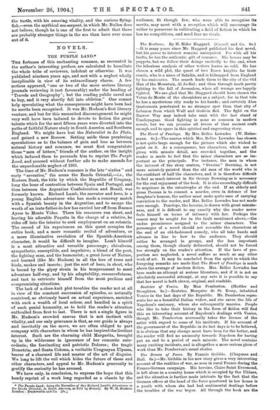'Tun fortunes of this enchanting romance, as recounted in the
author's interesting preface, are calculated to humiliate the whole tribe of reviewers, indolent or otherwise. It was published nineteen years ago, and met with a neglect wholly inexplicable in view of its extraordinary charm. A few motices appeared, "one or two of the more serious literary journals reviewing it (not favourably) under the heading of
Travels and Geography' ; but the reading public cared not to buy, and it very shortly fell into oblivion." One cannot help speculating what the consequences might have been had its merits been recognised. It was Mr. Hudson's first literary 'venture, and but for this unmerited discouragement he might -very well have been induced to devote to fiction the great 'talents which for the next fifteen years were diverted into the paths of faithful Nature study in South America and Southern England. We might have lost the Naturalist in La Plata, and gained a new Borrow. Setting aside these perplexing speculations as to the balance of gain and loss as between natural history and romance, we must first congratulate those "men of letters," friends of the author, on the insight which induced them to persuade him to reprint The Purple _Land, and proceed without further ado to make amends for the unpardonable neglect of 1885.
The time of Mr. Hudson's romance is the late " sixties " and .early "seventies," the scene the Banda Oriental,—i.e., the Eastern Bank, the title by which the Republic of Uruguay, long the bone of contention between Spain and Portugal, and then between the Argentine Confederation and Brazil, was formerly known. Richard Lamb, the narrator and hero, is a young English adventurer who has made a runaway match with a Spanish beauty in the Argentine, and to escape the
-wrath of an irate father-in-law has carried her off from Buenos Ayres to Monte Video. There his resources ran short, and leaving his adorable Paqufta in the charge of a relative, he rides off into the interior to seek employment on an estancia. `The record of his experiences on this quest occupies the -entire book, and a more romantic recital of adventure, or a more illuminative revelation of the Spanish-American .character, it would be difficult to imagine. Lamb himself is a most attractive and versatile personage ; chivalrous, sympathetic, susceptible, and impulsive; a blend of the poet, the fighting man, and the humourist ; a great lover of Nature, and learned (like Mr.' Hudson) in all the lore of trees and birds, snakes and insects ; just the sort of hero, in short, who is bound by the gipsy strain in his temperament to meet adventure half-way, and by his adaptability, resourcefulness, and tact to, extricate himself from the most perilous and -compromising situations.
The lack of a close-knit plot troubles the reader not at all
in view of the constant succession of episodes, so naturally -contrived, so obviously based on actual experience, enriched with such a wealth of local colour, and handled in a spirit of such genial humanity, as to hold the reader's attention • enthralled from first to last. There is not a single figure in Mr. Hudson's crowded canvas that is not instinct with vitality, and our only grievance is that, as our guide is always and inevitably on the move, we are often obliged to part -company with characters in whom he has inspired the liveliest interest. Such are the charming child Margarita, brought up in the wilderness in ignorance of her romantic ante- oedents ; the fascinating and patriotic Dolores ; the tragic Demetria; and Santa Coloma, a veritable Uruguayan Ulysses, bearer of a charmed life and master of the art of disguise. We long to lift the veil which hides the future of these and other characters, and appeal to Mr. Hudson's generosity to gratify the curiosity he has aroused.
We have only, in conclusion, to express the hope that this handy reprint of a work long regarded as a classic by the
• The Purple. Land : being the Narrative of One'Bichard Lamb's Adventures in the Banda Orientdl, in South America, as Told by Himself. By W. H. Hudson. London : Duckworth and Co. [6s.] audience, fit though few, who were able to recognise its merits, may meet with a reception which will encourage its writer to persevere in cultivating a field of fiction in which he has no competitors, and need fear no rivals.














































 Previous page
Previous page